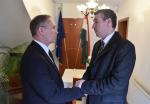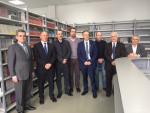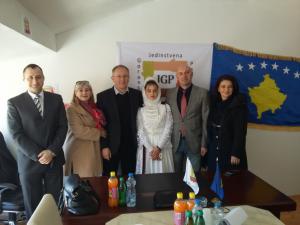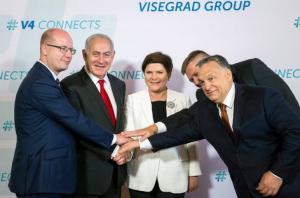Keresés: %s
Keresés: %s
Colleagues
1. H.E. József BENCZE - Ambassador Extraordinary and Plenipotentiary
2. Mr. Béla BOZSIK – Envoy Extraordinary and Minister Plenipotentiary , Deputy Head of Mission
3. Mr. László FARAGÓ - Second Secretary, Consul
4. Mr. Márton Péter NIKOWITZ-HOLLÓ - Second Secretary
5. Mr. Áron KERÉKGYÁRTÓ - Second Secretary, Economic and Trade Attaché
6. Mrs. Lili BOGSCH - Third Secretary, Consul
7. Mrs. Júlia ZSOLDOS - Consular Officer
8. Mrs. Noémi PÁSZTOR - Personal Assistant to the Ambassador
9. Mrs. Mária VESZELY - Head of Treasury
10. Mrs. Dafina ARAPI - Personal Assistant to the Ambassador
11. Mrs. Mirdita BICAJ - Personal Assistant to the Trade and Commercial Attaché
12. Mrs. Orsolya GÁL - Consular Administrator
13. Mr. Ismail OSMANI - Driver
14. Mrs. Alije MAKSUTI - Consular Assistant
15. Mr. Yll MUSLIU - Consular Assistant
The Hungarian Prime Minister proposed a new policy for Balkan countries
~~At a press conference held in Bratislava after an informal summit of leaders of EU Member States, Prime Minister Viktor Orbán said that the European Union should develop a new policy for Balkan countries outside the European Union. Tensions in the region are rising, and the European Union’s material influence over events there is continuously declining, while the influence of others is continuously increasing.
The First Hungarian-Albanian Dictionary (1913)
http://www.tti.hu/esemenyek/konferencia/2389-csaplar-degovics-krisztian-eloadasa-pri-tinaban.html
The Faculty of History – Pristina University, the Institute for International and Political Studies in Skopje, the UBT – University of Business and Technology in Pristina and the University Kadri Zeka – Gjilan organised a conference in Pristina entitled “Relations of Albanian people with Austria- Hungary/Austria from mid XIX century until today”.
 Mr. Krisztián Csaplár-Degovics, Senior Research Fellow of the Institute of History of the Hungarian Academy of Sciences delivered a lecture on the birth of the first Albanian-Hungarian Dictionary
Mr. Krisztián Csaplár-Degovics, Senior Research Fellow of the Institute of History of the Hungarian Academy of Sciences delivered a lecture on the birth of the first Albanian-Hungarian Dictionary
Book of Condolence
 In memory of the victims who died in the tragic bus accident in Italy on 21st January, the Embassy of Hungary in Pristina opened a Book of Condolence which was personally signed by the President of the Assembly of the Republic of Kosovo Kadri Veseli, members of the Diplomatic Corps and of the political parties.
In memory of the victims who died in the tragic bus accident in Italy on 21st January, the Embassy of Hungary in Pristina opened a Book of Condolence which was personally signed by the President of the Assembly of the Republic of Kosovo Kadri Veseli, members of the Diplomatic Corps and of the political parties.
Hand-over ceremony
 Hand-over ceremony was held at the University of Pristina. The Ambasador of Hungary H. E. Mr. László Márkusz personally handed the Hungarian book donation to the Rector of the University of Pristina Prof. Dr. Marjan Dema.
Hand-over ceremony was held at the University of Pristina. The Ambasador of Hungary H. E. Mr. László Márkusz personally handed the Hungarian book donation to the Rector of the University of Pristina Prof. Dr. Marjan Dema.
Visit to Dragaš
Upon the invitation of Adem Hoxha Gorani MP in the Kosovo Assembly dr. László Márkusz and his wife Suada Aganović-Márkusz visited Dragaš on 16 February 2017. After the warm welcome the Hungarian Ambassador and his wife discussed the issues that concern the Goranian community of 12 thousand people, the opportunities in local agriculture and tourism. The locals are immensely proud of their cheese, herbs and honey. The guests also met Deputy Minister of Justice Mr. Nusret Hoxha in the picturesque environment of Mountain Šar. 
Wizz Air flight
The first Wizz Air flight from Budapest arrived at Prishtina International Airport Adem Jashari on 7th of April 2017.
Facts about Hungary
- History: Hungary has a long tradition in history – 1100 years. She is one of the oldest countries in Europe. The first groups of Hungarian people arrived to the current location in 896. King Stephen founded the independent state of Hungary in 1000. Head of state is Mr. János Áder, prime minister is Mr. Viktor Orbán. Hungary joined NATO in 1999 and the EU on 1 May 2004. Member of UN since 1955 and of the OECD since 1996.
-
Geography: Hungary is a land-locked country in Central Europe sharing her borders with Austria, Slovenia, Croatia, Serbia, Romania, Ukraine and Slovakia. The population of Hungary is 9 799 000. Her capital city is Budapest with a population of 1.8 million people. Her territory is 93 000 km2. She consists of 19 counties, there are 3154 towns and villages.
-
Population: Over 93% of the population are Hungarians and 99% speak Hungarian. Ethnic minorities: Bulgarian, Greek, Croatian, Polish, German, Armenian, Roma, Romanian, Rusyn, Serbian, Slovak, Slovene, Ukrainian.
-
Main economic figures: Total GDP: 264 221 million euros, GDP/capita: 22 395 EUR, Inflation: 2,1%. GDP growth: 2.0% Unemployment rate: 5,1%. Public debt: 74,1% of GDP. Budget deficit: -1,7% of GDP. Total budget: 58,9 billion euros. Official currency is the Hungarian Forint (HUF). 1 EUR = 305 HUF. Corporate tax – 9%, lowest in Europe, social contribution tax – 22%. (Sources: OECD and Hungarian Central Statistical Office)
-
Foreign direct investment: In 2017 47 new investments arrived to Hungary in the value of 1,3 billion euros creating 8502 jobs. In 2016 this value was 3,24 billion euros. The Hungarian government signed agreements on strategic cooperation with international companies, who have their regional center or factory in Hungary and with the biggest Hungarian companies: for example Audi, Bosch, Coca Cola, General Electric, Hungarian Telekom, Lego, Richter Gedeon, Samsung, and Siemens.
-
Leading sectors in Hungary: car industry, electronics, and informatics. Hungary is proud of its results in health care and agriculture.
-
Education: The Hungarian government introduced a new model in education through the cooperation of leading companies, the local universities, the local government and the government. This helps creating centers for research and development. Good examples are in Győr with Audi and in Kecskemét with Mercedes. Hungary offers 4655 scholarships for the students of 97 countries through the Stipendium Hungaricum program. For Kosovo there are 50 scholarships.
-
Nobel Prize winners (Hungarian and of Hungarian origin): Philipp Lenard, Physics (1905); Robert Bárány, Medicine (1914); Richard Zsigmondy, Chemistry (1925); Albert Szent-Györgyi, Medicine (1937); George de Hevesy, Chemistry (1943); Georg von Békésy, Medicine (1961); Eugene Wigner, Physics, shared (1963); Dennis Gabor, Physics (1971); Milton Friedmann, Economics (1976); Elie Wiesel, Peace (1986); John Charles Polányi, Chemistry, shared (1986); John Harsányi, Economics, shared (1994); George Olah, Chemistry (1994); Imre Kertész, Literature(2002); Avram Hershko, Chemistry, shared (2004). Until 2020 the government wants to increase the support of the research and development sector to 1,8% of the GDP.
-
Sport: 176 gold medals so far on the Olympic Games. In the overall ranking of countries Hungary is the 8th most successful country. Hungary’s most successful sports: fencing with 37 gold medals, swimming with 28 gold medals, kayak and canoe with 25 gold medals, wrestling with 19 gold medals. In the team events, the Hungarian water polo team won 9 gold medals.
-
Tourism: Hungary has a temperate continental climate. The country’s largest rivers are the Danube and the Tisza. Lake Balaton is Central Europe’s largest freshwater lake – 77 km long, 1,5-11 km wide, 596km2. Hungary’s 10 national parks, 37 nature conservation areas and 163 national reserves, covering a total of 836,507 hectares (or 9 per cent of its territory) play an important part in the protection of the country’s indigenous flora and fauna. Hungary’s medicinal and thermal water reserves, by volume second only to Iceland, are of outstanding importance. The temperature of some of its mineral-rich spa water exceeds 70°C. Nearly 1,300 thermal wells are registered today, 270 of which are suitable for recreational purposes. Part of world heritage: the Banks of the Danube, the Buda Castle Quarter and Andrássy Avenue in Budapest, Caves of Aggtelek Karst, Early Christian Necropolis of Pécs, Fertő/Neusiedlersee Cultural Landscape, Hortobágy National Park, Millenary Benedictine Abbey of Pannonhalma and its Natural Environment, Old Village of Hollókő and its Surroundings, and Tokaj Wine Region Historic Cultural Landscape. Beside Tokaj there are 21 wine regions.
Hungarian Presidency 2017/2018 of the Visegrad Group
From July 2017 to June 2018, Hungary is holding the rotating Presidency of the Visegrad Group for the fifth time. The importance of the Visegrad Cooperation, based on the principles guiding the V4 since its founding in 1991, namely mutual trust, flexibility, and a focus on common traditions, values and interests, has been growing recently.
The Hungarian Presidency builds on the goals and achievements of previous V4 Presidencies. The priorities also reflect a proper balance, as necessitated by current political developments and actual needs, between tasks related to the V4’s common voice in the EU, preserving the importance of traditional policies (Cohesion Policy and Common Agricultural Policy), cooperation with neighbouring and other European countries, as well as V4 activities related to global partners, global issues and the further strengthening of the V4 brand.
The motto of the Hungarian Presidency, V4 Connects, reflects the significant positive impact of the Visegrad Cooperation in connecting the four countries in terms of politics, economy and culture, while also referring to the Presidency's focus on our tasks related to connectivity: improving energy and transport links in our broader region, and working on a well-connected, innovative region ready for the digital age.

The first summit meeting between the V4 countries and the State of Israel.
 The Heads of Government of Hungary, the Republic of Poland, the Czech Republic, the Slovak Republic and the Prime Minister of the State of Israel convened in Budapest on 19 July 2017 at the first summit meeting between the V4 countries and the State of Israel. The participating countries were represented by H.E. Mr. Viktor Orbán, Prime Minister of Hungary, H.E. Mrs. Beata Szydło, Prime Minister of the Republic of Poland, H.E. Mr. Bohuslav Sobotka, Prime Minister of the Czech Republic, H.E. Mr. Robert Fico, Prime Minister of the Slovak Republic and H.E. Mr. Benjamin Netanyahu, Prime Minister of the State of Israel.
The Heads of Government of Hungary, the Republic of Poland, the Czech Republic, the Slovak Republic and the Prime Minister of the State of Israel convened in Budapest on 19 July 2017 at the first summit meeting between the V4 countries and the State of Israel. The participating countries were represented by H.E. Mr. Viktor Orbán, Prime Minister of Hungary, H.E. Mrs. Beata Szydło, Prime Minister of the Republic of Poland, H.E. Mr. Bohuslav Sobotka, Prime Minister of the Czech Republic, H.E. Mr. Robert Fico, Prime Minister of the Slovak Republic and H.E. Mr. Benjamin Netanyahu, Prime Minister of the State of Israel.
KFOR Tactical Reserve Battalion successfully conducted the Exercise Dragon Fire
 KFOR Tactical Reserve Battalion (KTRBN) along with other KFOR units successfully conducted the Exercise Dragon Fire. The participating troops have practiced air assault, cordon and search operations and at the same time have enhanced interoperability within KFOR multinational contingents. Major General Giovanni Fungo in his speech emphasized the importance of collective training to ensure the KFOR reserve force flexibility and responsiveness
KFOR Tactical Reserve Battalion (KTRBN) along with other KFOR units successfully conducted the Exercise Dragon Fire. The participating troops have practiced air assault, cordon and search operations and at the same time have enhanced interoperability within KFOR multinational contingents. Major General Giovanni Fungo in his speech emphasized the importance of collective training to ensure the KFOR reserve force flexibility and responsiveness
(The KFOR Tactical Reserve Battalion (KTRBN) consist of Hungarian soldiers.)
Majlinda Kelmendi was chosen the Best Female Judoka
The Hungarian Embassy in Pristina congratulates to Majlinda Kelmendi who was chosen the Best Female Judoka at the Hungarian State Opera House in Budapest during International Judo Federation (IJF) Gala on Sunday evening.
http://www.euronews.com/2017/08/28/judo-honours-great-and-good-on-its-65th-anniversary
ANNOUNCEMENT
Kosovar citizens can enter the territory of the Schengen area, including the territory of Hungary only with having a valid Schengen visa (unless they have valid residence permits or valid long-term visas). In addition to a valid visa, each person concerned must fulfill the entry conditions provided for by the relevant EU legislation. For example: the validity of their passport shall extend at least three months after the intended date of departure from the territory of the member States, can justify the purpose and circumstances of the intended stay and adequate financial means; are not subject to an alert entry.
At the border between Hungary and Serbia, there is a temporary security barrier with high razor wire fences and consisting of various surveillance and alarm equipment. It is not possible to pass physically through this security barrier.
Cutting or cutting through some of the safety locks can cause serious injuries. However, those who damage the security barrier commit a criminal offence, which may be punishable by imprisonment. Pending the judgment the trespassers may be taken into custody.
The sole purpose of human trafficker is to mislead their victims with false information, thereby gaining their money and other assets.
With regard to the conditions of entry to Hungary, the Embassy of Hungary in Pristina can provide reliable information to all interested persons.
NJOFTIM
Qytetarët e Kosovës mund të hyjnë në zonën e Schengenit, kështu si dhe në teritorin e Hungarisë vetëm me vizë valide të Schengenit (përveҫ, nëse posedojnë leje qëndrim valid të përkohshëm ose lejeqëndrim afatgjatë). Të gjithë personat në fjalë, përpos vizës valide duhet të plotësojnë kushtet e caktuara në ligjet e BE-së (shembull: vlefshmëria e pasaportës duhet të paktën tre muaj të tejkalojë kohën e planifikuar të largimit nga shtetet anëtare, duhet të vërtetojnë qëllimin dhe rrethanat e qëndrimit të parashikuar, duhet të kenë sigurimin e duhur të mbulimit financiar, si dhe nuk duhet të kenë ndonjë ndalesë për të hyrë ne zonën schengen).
Në kufirin mes Hungarisë dhe Serbisë shtrihet rrethoja e përkohëshme e sigurisë kufitare, e cila është ndërtuar nga shtigjet e gjata dhe nga mjetet e ndryshme të monitorimit dhe alarmit. Kalimi i kësaj pengese fizikisht nuk është i mundur.
Kapërcimi, prerja e rrethojes kufitare mund të shkaktojë lëndime serioze. Megjithatë kushdo që dëmton rrethojën kufitare kryen një vepër penale, e cila mund të denohet me burgim. Kryerësi i veprës mund të arrestohet gjatë pritjes së aktgjykimit deri në një vendim të gjyqit.
Qëllimi i vetëm i kontrabandistëve është të mashtroj viktimat e tyre me informacione të rrejshme, duke përfituar kështu nga paratë dhe pasuritë e tyre.
Sa i përket kushteve të hyrjës në Hungari, Ambasada e Hungarisë në Prishtinë mund të sigurojë informacion të besueshëm për të gjithë personat e interesuar.
U15 European Weightlifting Championship
The Embassy of Hungary congratulates to Adrián Terebesi who won three gold medals on the U15 European Weightlifting Championship in Pristina on 27 September 2017 in the category of men 77 kg.

Dear Travellers / visa applicants!
DEAR TRAVELLERS,
We would like to inform you that our Embassy has introduced a new Visa Appointment System!
For more information, please check tab: VISAS
Kind regards,
Consular Section
Meeting with Kadri Veseli the Speaker of the Kosovo Parliament

Ambassador László Márkusz informed the Speaker of the Kosovo Parliament (Kuvendi) about the meeting of Western Balkan Speakers in Budapest on 27th October.
Tourism
Dear Visitors of Budapest!
The brochure of Budapest is available under the following link:
http://issuu.com/bftknonprofitkft/docs/bp_guide_2015_en?e=15147037/13129072
The brochure of Budapest
Dear Visitors of Budapest!
The brochure of Budapest is available under the following link:
http://issuu.com/bftknonprofitkft/docs/bp_guide_2015_en?e=15147037/13129072
EU-HoMs Statement
EU-HoMs Statement
on the Kosovo municipal and mayoral elections on 22 October 2017
Voters in Kosovo exercised their democratic rights by voting in municipal elections on Sunday. At the invitation of the President of Kosovo, the EU deployed an Election Observation Mission (EOM), the fourth fully fledged EU election observation mission of the kind in Kosovo. As for the June legislative elections it was once again headed by the Chief Observer Alojz Peterle, Member of the European Parliament.
We are pleased that, according to the Preliminary Statement, which the EU EOM issued earlier this week, the elections were overall held in a calm and orderly manner in most parts of Kosovo. At the same time, the EU HoMs noted with serious concern that the campaign environment was marred by intimidation within many Kosovo Serb communities and that the election process within Kosovo Serb-majority municipalities thus did not meet some international and European standards for democratic elections.
EOM identified a continuous, co-ordinated and concerning pattern of intimidation within Kosovo Serb majority areas, directed against candidates competing against Srpska Lista. This included pressure on individual candidates to withdraw and restricted political competition, raising questions about key principles of the overall democratic process in those areas. Persistent weaknesses in the election process were also repeatedly observed by the Mission that were not sufficiently addressed prior to these elections. We call upon all relevant actors from the entire political and community spectrum to address these shortcomings without any further delay.
In line with established practice, a Final Report containing recommendations on the improvement of the wider electoral framework will be released by the EU EOM after the end of the current electoral process, including the second round of Mayoral elections to be held in four weeks' time in some municipalities. These recommendations will help the Kosovo authorities in their efforts to improve the electoral framework and thus to further improve and consolidate democratic governance and institutions. The EU is fully committed to supporting the Kosovo authorities in these efforts, including through an ODIHR-implemented regional project.
